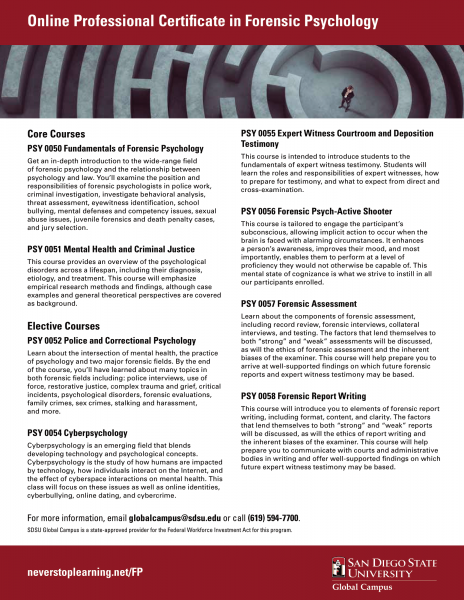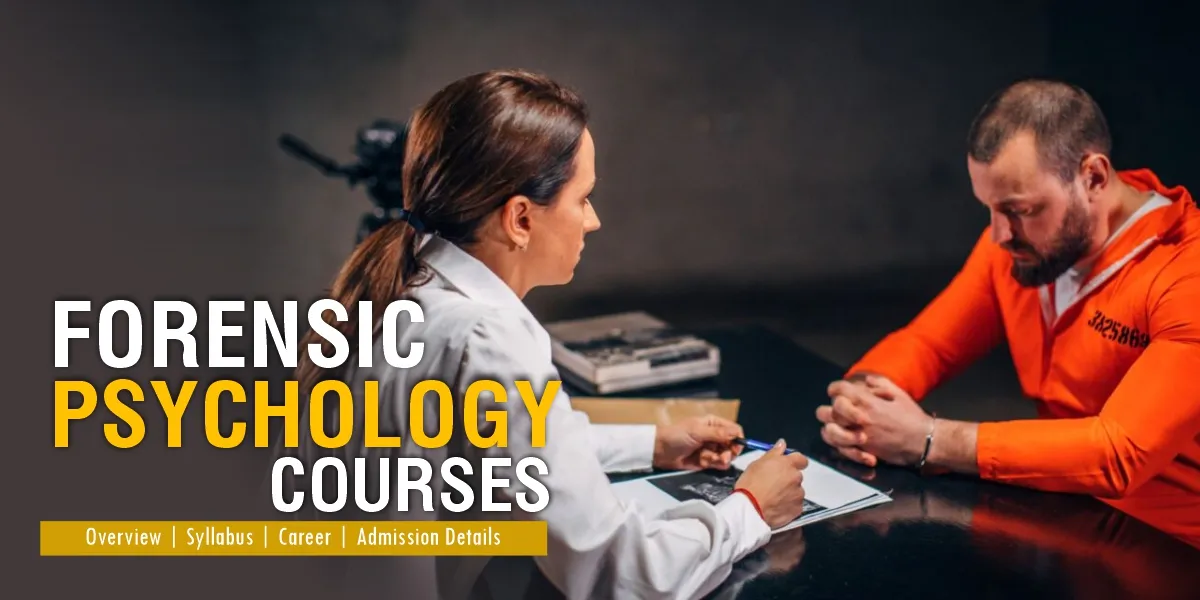
How to Become a Forensic Psychology Course: Step-by-Step Guide
Are you fascinated by the human mind and its mysteries? Do you find yourself intrigued by the role psychology plays in the justice system?
If so, becoming a forensic psychologist could be your perfect career path. This field combines the science of psychology with the intricacies of the legal system, offering a unique and fulfilling professional journey. But where do you start? How do you transform your passion into a career?
In this guide, you’ll discover the essential steps you need to take to enroll in a forensic psychology course. From understanding the prerequisites to choosing the right program that aligns with your career goals, we’ll cover it all. By the end of this article, you’ll have a clear roadmap to follow, ensuring your path to becoming a forensic psychologist is as smooth and informed as possible. Stick around, and unlock the first steps to a career that makes a real impact in the world.

Understanding Forensic Psychology
Forensic psychology blends psychology with the legal system. It helps understand criminal behavior. Professionals in this field work with law enforcement and the courts. They assess and treat individuals within the justice system. It’s a fascinating area that attracts those curious about the human mind and justice. Let’s explore the role and opportunities in forensic psychology.
Role And Responsibilities
Forensic psychologists assess the mental state of criminals. They evaluate if someone is fit to stand trial. They offer expert opinions in court. These professionals often work with victims and offenders. They help design rehabilitation programs. Their insights aid in understanding criminal behavior patterns. They must maintain ethical standards and confidentiality.
Career Opportunities
Forensic psychology offers diverse career paths. One may work in prisons or juvenile detention centers. Others find roles in law enforcement agencies. Some become consultants for legal teams. Universities and research institutions also offer positions. Opportunities exist in policy-making bodies too. Each path offers unique challenges and rewards.
Educational Pathway
Explore the educational path to becoming a forensic psychologist. Start with a bachelor’s degree in psychology. Then pursue a master’s or doctoral degree in forensic psychology. Gain experience through internships or research opportunities. This pathway combines psychology and law to understand criminal behavior.
Embarking on the journey to become a forensic psychologist is both exciting and demanding. The educational pathway is your roadmap, guiding you through the essential steps to reach your goal. Understanding the right courses and degrees can significantly impact your career trajectory. Let’s break down the options to help you make informed decisions.
Bachelor’s Degree Options
Your journey begins with a bachelor’s degree. Choose a major in psychology, criminal justice, or a related field. These programs lay the groundwork for understanding human behavior, a critical aspect of forensic psychology. Psychology courses will introduce you to the basics of human thought and behavior. Meanwhile, criminal justice classes will provide insight into the legal system. Consider internships or volunteer work in forensic settings to gain practical experience.
Master’s And Doctoral Programs
After your bachelor’s degree, pursuing a master’s or doctoral program is the next step. A master’s degree in forensic psychology can open doors to entry-level positions. It typically covers psychological theories and their application in the legal arena. However, to work as a licensed forensic psychologist, you’ll need a Ph.D. or Psy.D. These programs delve deeper into research and clinical practice. They also require internships and supervised experience, crucial for developing expertise. Have you considered what specialization might align with your career goals? Whether you’re interested in criminal profiling, victim advocacy, or court consultations, advanced degrees allow you to tailor your education to your interests. Navigating the educational path can be overwhelming. Reflect on your passion and where you see yourself making the most impact. Your educational choices should not only fulfill academic requirements but also fuel your enthusiasm for the field.
Key Skills And Competencies
Embarking on a career in forensic psychology is more than just understanding criminal minds. It requires a unique set of skills and competencies that equip you to handle the complexities of the field. As you pursue a forensic psychology course, honing these skills will not only make you a better professional but also enhance your ability to contribute effectively to the justice system. Let’s dive into the key skills and competencies you’ll need.
Communication Skills
Effective communication is at the heart of forensic psychology. You must be able to express your thoughts clearly and understand the perspectives of others. Imagine you’re in a courtroom, explaining your findings. Your ability to articulate complex psychological concepts in simple terms can be the difference between clarity and confusion.
Being a good listener is equally important. When interviewing subjects, your ability to pay attention and interpret verbal and non-verbal cues can unveil crucial insights. How will you ensure your communication is impactful?
Analytical Thinking
Forensic psychology demands sharp analytical skills. You need to assess behaviors, evaluate evidence, and form conclusions based on facts. Think of yourself as a detective, piecing together a puzzle where each piece is a behavior or trait.
Consider the case of a suspect with a complex background. Your analytical prowess will help you understand the motivations behind their actions. Developing this skill will empower you to make informed decisions that can influence case outcomes.
Ethical Decision Making
Ethical integrity is non-negotiable in forensic psychology. You’ll face moral dilemmas that require sound judgment. Picture yourself analyzing a case where the truth may harm an innocent person. How do you balance justice with compassion?
Your decisions must reflect ethical principles, ensuring fairness and respect for all parties involved. Cultivating this competency will earn you trust and credibility in your professional journey.
As you refine these skills, remember that each competency builds upon the other. Communication, analysis, and ethics are interwoven in the fabric of forensic psychology. Which skill will you focus on developing first?
Certification And Licensure
Certification and licensure are key steps in becoming a forensic psychologist. These credentials show your expertise and commitment. They open doors to new job opportunities. Understanding these requirements can guide your journey toward a successful career. Let’s explore what you need for certification and licensure in forensic psychology.
State Requirements
Each state has unique rules for forensic psychology practice. You must meet specific educational and training standards. An accredited doctoral degree is often required. States may also demand supervised professional experience. Passing a state licensing exam is typically necessary. Check your state’s requirements early in your education journey.
Board Certification
Board certification enhances your professional credibility. It involves rigorous evaluation and peer review. The American Board of Professional Psychology provides certification for forensic psychologists. You need a doctoral degree, relevant experience, and successful completion of exams. Achieving board certification can distinguish you in your field. It signifies specialized knowledge and dedication to quality practice.
Gaining Practical Experience
Developing skills in forensic psychology requires hands-on experience. Participate in internships to understand real-world situations. Engaging in fieldwork sharpens your analytical and observational abilities.
Gaining practical experience is a crucial step in your journey to becoming a proficient forensic psychologist. Engaging directly with real-world scenarios enhances your understanding and provides the hands-on skills that textbooks can’t offer. Whether it’s through internships, fieldwork, or networking, these experiences are your bridge from theory to practice.
Internships And Fieldwork
Internships are your gateway to the professional world of forensic psychology. They offer you a chance to work alongside experienced psychologists, observe their methods, and understand the nuances of the field. Consider applying for internships at correctional facilities, mental health institutions, or law enforcement agencies. Fieldwork provides invaluable exposure to real cases. You might assist in criminal profiling, conduct psychological assessments, or help with research projects. These experiences not only enhance your resume but also give you confidence and clarity about your career path.
Networking Opportunities
Networking is more than just attending conferences. It’s about building relationships with mentors, peers, and professionals who can guide you. Start by joining psychology forums, attending workshops, and participating in seminars related to forensic psychology. Don’t underestimate the power of social media and online platforms. Connecting with professionals on LinkedIn or joining relevant groups can open doors to opportunities you might not find elsewhere. Have you reached out to someone in the field whose work you admire? A simple message can sometimes lead to mentorship or collaboration opportunities. Remember, gaining practical experience is not just about checking boxes. It’s about immersing yourself in the field, learning from every interaction, and continuously seeking growth. Are you ready to take the next step in your forensic psychology journey?

Continuing Education
Continuing education is a crucial element in the journey of becoming a forensic psychologist. The field is ever-evolving, demanding professionals to stay informed about new findings and methodologies. It’s about embracing lifelong learning to enhance your skills and knowledge. This section will guide you on how to keep your education alive and thriving.
Workshops And Seminars
Attending workshops and seminars can be a game-changer. These events offer you the chance to learn directly from leading experts in forensic psychology. Imagine sitting in a room filled with passionate individuals, all eager to share their insights and experiences. You get to ask questions, engage in discussions, and build networks that could be invaluable for your career.
Workshops often provide hands-on experience, allowing you to practice techniques under guidance. Seminars, on the other hand, dive deep into specific topics, offering detailed presentations and case studies. Does a weekend seminar on criminal profiling pique your interest? Or perhaps a workshop on therapeutic approaches for offenders? These can significantly broaden your understanding and keep your skills sharp.
Staying Updated With Research
Research is the backbone of forensic psychology. It’s essential to keep abreast of the latest studies and findings. How do you achieve this? Subscribe to reputable psychology journals or online platforms that publish current research. Engage with the material actively, question the conclusions, and consider how they apply to your practice.
Joining online forums or research groups can also be beneficial. These communities discuss new research trends and share insights. You might stumble upon groundbreaking studies that challenge your existing beliefs. Are you ready to adapt your methods based on the latest evidence? Staying updated ensures your practice remains relevant and effective.
Continuing education isn’t just a requirement; it’s an opportunity. How will you seize it to advance in forensic psychology? The choices you make now will shape your future in this dynamic field. Embrace the learning journey, and let it propel you toward your goals.
Challenges In The Field
Forensic psychology combines the fields of psychology and law. It deals with the application of psychological expertise in legal contexts. Aspiring forensic psychologists face numerous challenges. These challenges demand a deep understanding of human behavior and law. This section explores some of these challenges. It aims to provide insights into the field’s complexities.
Ethical Dilemmas
Forensic psychologists often face tough ethical decisions. They must balance truth and confidentiality. Their role may involve testifying in court. This can lead to conflicts between personal and professional ethics. Ensuring fair treatment for all parties is crucial. The stakes are high in criminal cases. Missteps can have serious consequences. Professionals must navigate these dilemmas with care.
Complex Cases
Forensic psychology involves dealing with intricate cases. Each case brings unique challenges and details. Psychologists must analyze evidence and behaviors. This requires critical thinking and attention to detail. They work with diverse populations. These include victims, offenders, and law enforcement. Understanding different perspectives is vital. It aids in delivering accurate assessments. Complex cases demand resilience and perseverance.

Frequently Asked Questions
What Qualifications Are Needed For Forensic Psychology?
To become a forensic psychologist, you typically need a bachelor’s degree in psychology. After that, a master’s or doctoral degree in forensic psychology or a related field is essential. Licensure is often required, depending on the region. Gaining experience through internships or relevant work placements can also be beneficial.
How Long Does It Take To Study Forensic Psychology?
Becoming a forensic psychologist usually takes around 6 to 10 years. This includes earning a bachelor’s degree, followed by a master’s or doctoral degree. Additional time may be needed for internships, licensure, and gaining professional experience. The exact duration depends on the specific educational and career path chosen.
What Do Forensic Psychologists Do?
Forensic psychologists apply psychological principles to legal matters. They assess individuals involved in the legal system, provide expert testimony, and conduct research. Their work can include evaluating mental competency, providing therapy to offenders, and consulting with law enforcement. They play a crucial role in bridging psychology and the justice system.
Is Forensic Psychology A Good Career Choice?
Forensic psychology can be a rewarding career for those interested in both psychology and law. It offers diverse opportunities in legal, criminal, and civil areas. The demand for forensic psychologists is growing, providing job stability. However, the career can be challenging and requires strong analytical and communication skills.
Conclusion
Embarking on a forensic psychology course is a rewarding journey. It opens doors to understanding human behavior in legal settings. Start by researching accredited programs that fit your needs. Consider both online and in-person options. Build a solid foundation in psychology and law.
Engage in internships for hands-on experience. Networking with professionals can provide valuable insights. Stay committed and curious throughout your studies. This dedication will guide you towards a successful career. Remember, each step brings you closer to your goal. Your passion and perseverance will make a difference.
Embrace the challenge and enjoy the learning process.




